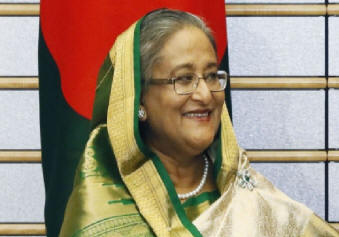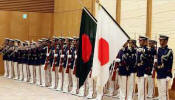|
|
|||
|
|
|
|
|
Pakistan's premier website that covers current affairs and news.
Japan’s FOIP and Bangladesh’s Strategic Significance
When then-Prime Minister Abe visited Dhaka in September 2014, the Bay of Bengal Industrial Development Belt (BIG-B) initiative for joint economic cooperation was unveiled as part of Japan’s broader strategy for a Free and Open Indo-Pacific (FOIP). As Japan and Bangladesh worked toward improved economic and geopolitical ties, this signaled the beginning of a new era in their relations.

Bangladesh is viewed under the BIG-B plan as a bridge between South Asia and Southeast Asia. In Kishida’s March updated of Japan’s FOIP vision, he said Japan viewed “Bangladesh and other areas to the south as a single economic zone,” and pledged to “promote the Bay of Bengal-Northeast India industrial value chain concept in cooperation with India and Bangladesh to foster the growth of the entire region.”
Viewed from the strategic level, this is a plan to link the Pacific and Indian Oceans to strengthen Japan’s economy within a larger geopolitical context. Bangladesh’s geographic location enables it to serve as both a node and a hub in regional and interregional commercial activities.
In the past, Japan’s thrust was never security-oriented but now the scenario of world politics has changed. Japan is also trying to create its sphere of influence in the Indian Ocean region. Japan has been obliged to include South Asia as a key aspect of its strategic-diplomatic agenda as a result of the geostrategic demand for this area growing in recent years.
Japan is focusing on the security and strategic issues in its periphery – East Asia and Southeast Asia and extending into the Bay of Bengal.
Amid these developments, Japan realized Bangladesh’s strategic geographic position inside a triangle of three developing markets: India, China, and Southeast Asia. Japan and Bangladesh share many of the same fundamental values that drive the “Free and Open Indo-Pacific” concept, including democracy, a market economy, and a rules-based international order. Bangladesh also believes in Japan’s vision of FOIP as a bid to ensure peace and stability.
Prospects for Japan’s Security Cooperation With Bangladesh
With a shared goal to maintain peace and stability in the Indo-Pacific region, defense and security cooperation has become one of the key pillars of the Bangladesh-Japan relationship. One potential new area of collaboration with Bangladesh is the defense industry.
The “Forces Goal 2030” announced in 2009 by the Hasina government with a view toward significantly enlarging and modernizing the Bangladesh Army, Navy, and Air Force, spelled out Bangladesh’s defense aspirations. Dhaka is now aiming to increase its collaboration with Japan in several sectors to achieve those goals.
Japan recently loosened its regulations on the transfer of military hardware. Since then, Japanese businesses started supplying military gear to several Asian nations. As Bangladesh announced its intention to diversify its sources for acquiring military weaponry, it became a potential market for Japan’s defense exports.
Japan’s new structure for providing defense support, known as Official Security Assistance (OSA), was established in revisions to the National Security Strategy in December of last year. In its budget for the fiscal year 2023, the government set aside nearly $2 billion for OSA. Using these funds, Japan will assist nations to enhance their deterrence capabilities through the provision of defense equipment and other means. Bangladesh is among the four nations that will receive the first tranche of the new funding from the government.
The Bangladesh Air Force has shown a strong desire to purchase mobile radar equipment from Japan. Moreover, ICT security and cybersecurity are areas where Japan and Bangladesh should explore the possibility of collaboration. During Hasina’s visit, it is expected that Dhaka and Tokyo will sign a “letter of intent” on bilateral defense cooperation, which will pave the framework for future deals.
Remember that the main elements of FOIP include commerce, investment, and infrastructure development as well as defense and security. Aside from closer security cooperation, Japan will assist Bangladesh in realizing its economic potential, overcoming obstacles that may arise after Bangladesh no longer qualifies as a Least Developed Country (effective in 2026), and diversifying its diplomatic ties with major nations.
It is extremely significant to remember that Bangladesh is a key component of Japan’s security-diplomatic strategy in South Asia. In Japan’s strategic calculations, Bangladesh is significant not only for its unique location between South Asia and Southeast Asia and its direct access to the Indian Ocean, but also for its rising economic and political significance in the global arena. Bangladesh is crucial to Japan’s geopolitical stance; hence Japan considers Bangladesh indispensable for fulfilling its strategic vision in the region. Similarly, Bangladesh will benefit from having strong diplomatic connections with Japan while it implements its foreign policy strategy based on non-alignment and independence.
Bangladesh and Japan need to strengthen their security cooperation given the shifting geopolitical scenario. There is a compelling reason for the two governments to cooperate and work together, given how the security environment is evolving and how difficult the current scenario is.
Dr. Delwar Hossain is a professor of International Relations at the University of Dhaka. He is also the founder of the KRF Center for Bangladesh and Global Affairs (CBGA).
Subscribe to the Economist to read the full content.
April 22, 2023
Also Read
Growing Defense Relationship between Japan and Bangladesh
Share your views at feedback@newsflash.com.pk
Send your contributions at editor@newsflash.com.pk






